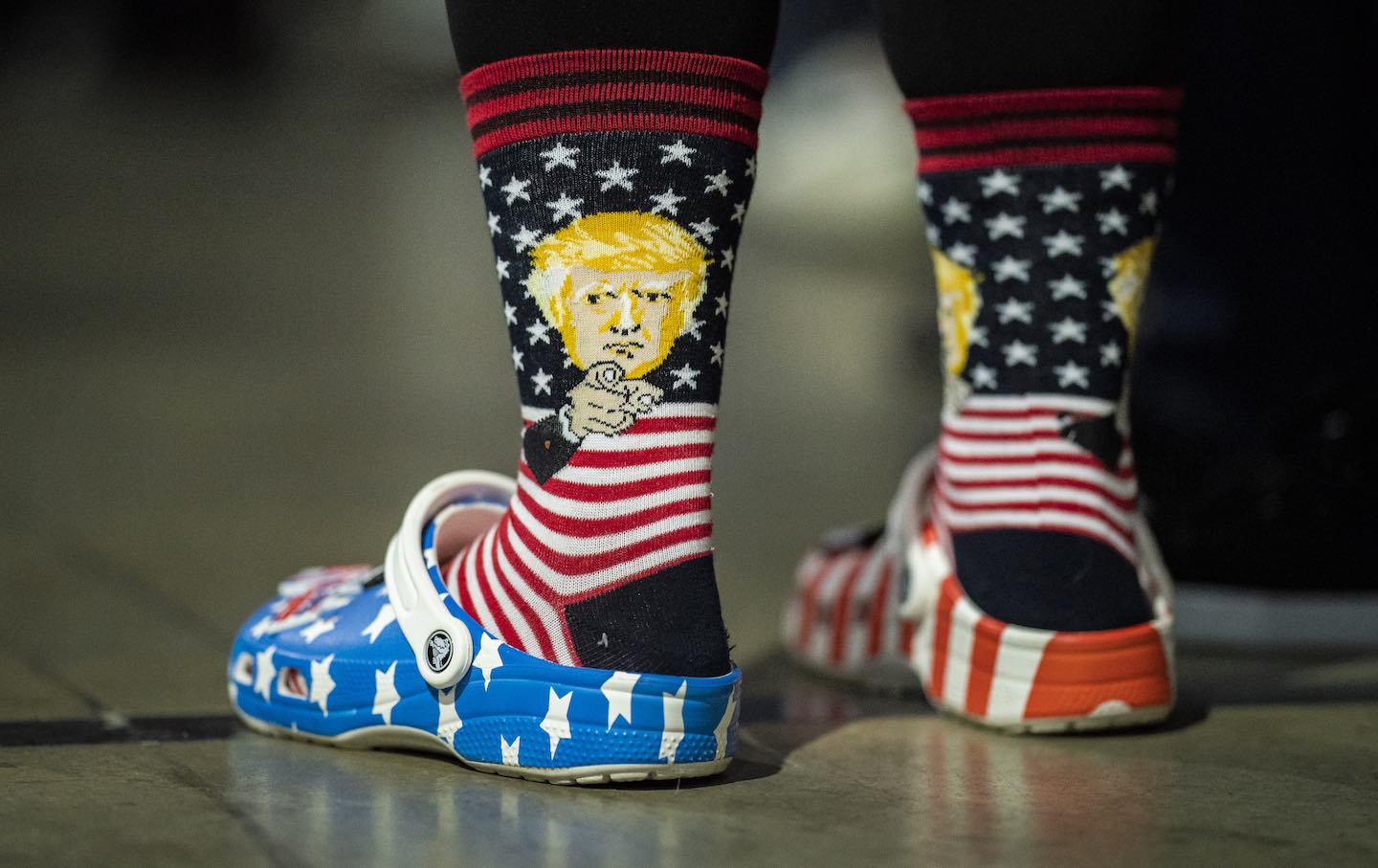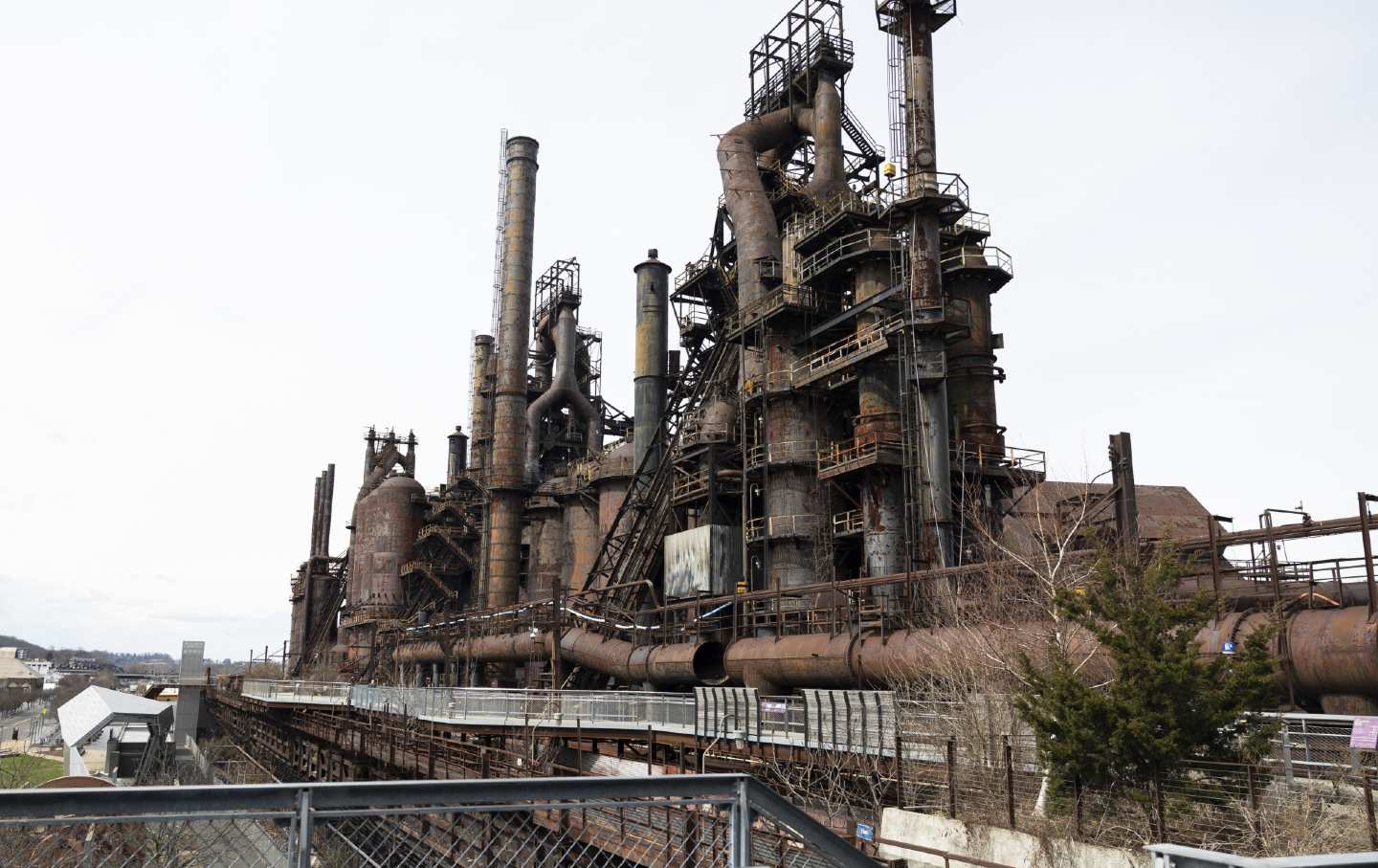Trump Isn’t on Nevada’s Primary Ballot. He May Still Win the Caucus.
Confused? So are Nevada voters.

A supporter wears socks depicting former president Donald Trump before he arrives to speak at a “commit to caucus” event held at the Reno-Sparks convention center on Sunday, December 17, 2023, in Reno, Nev.
(Jabin Botsford / The Washington Post via Getty Images)This past Monday, a tiny group of old, white, conservative evangelical Christian men in Iowa effectively anointed Trump the winner of the Republican caucus and primary season.
The headlines blared about Trump’s landslide victory—and it’s true that he won more than 50 percent of the vote and 98 of the state’s 99 counties. But it’s also true that turnout was abysmally low, even by Iowa caucus standards. This was, of course, hardly a surprise given an Arctic windchill that could have frozen the feet off of a polar bear, and given that, for weeks, the media had presented the result as a foregone conclusion. Why turn up for a futile vote against a criminal candidate-on-a-roll if it means you’re going to risk frostbite and, at the end of the day, achieve nothing more than pissing off your Trump-loving neighbors? In a state with 3 million residents, about 2.5 million of whom are of voting age, only 110,000 people caucused, and of those only slightly more than half cast their vote for Trump. In other words, about one in 40 of the state’s potential voters cast their lot with Trump in the caucus—yet, because of the bizarro nature of American politics and the crass horse race coverage generated by so much of the media, those few tens of thousands of ultraconservative, MAGA-loving Iowans have set the tone for the entire presidential race to come.
Turnout in New Hampshire’s primary next week will almost certainly be far higher. In February 2020, roughly 260,000 Granite State residents voted in the state’s Democratic contest. Given that the state has a population of less than half of that of Iowa, that implies a participation rate in the New Hampshire primary about five times higher than in the Iowa caucus. That’s hardly a surprise. After all, in a primary, you simply have to cast a ballot; you don’t have to devote an afternoon or evening to debating, or being berated by, your fellow citizens about who the best, or least worst, candidate might be.
It’s possible that Nikki Haley will manage to turn the corner and win enough votes in New Hampshire’s primary to (a) make it a genuine mano a mano race between her and The Donald; and (b) dent Trump’s image of inevitability enough that future races will become more competitive. But, realistically, it’s unlikely. The latest post-Iowa poll shows her trailing by 16 points.
Which brings us to Nevada, the third state on the nominating calendar, and one that will offer voters both a primary and a caucus.
If you think that’s confusing, you’re right.
Historically, the Silver State has had only an early-season caucus, which, like all caucuses, suffered from low voter turnout, and, with its byzantine rules, regularly descended into chaos. In 2016, a mere 75,000 voters took part in the state’s GOP caucus. And in 2016 and 2020, the Democratic caucuses were bedeviled both by low turnout and by rampant confusion over the caucus process. In 2021, with a growing chorus of Democrats calling for an overhaul of the system, the Democratic-controlled state legislature voted to implement a primary system in the state in an effort to expand the pool of participants. It allows for same-day voter registration, two weeks of early polling, mail-in voting, and the ability to change one’s party registration all the way up to the day of the election.
That might have been that, except for the fact that a MAGA-controlled state GOP—the chair of which, Michael McDonald, is currently under indictment for having been a false elector after the 2020 election—concluded that the caucus format benefited Trump. The party decided to stick with a 90-minute caucus, in which voters have to present IDs in order to participate, and which barred same-day voter registration. Not only that, it forced candidates to choose between running in the state-mandated primary and competing in the party-supported caucus (and required candidates to pony up $50,000 in order to participate in the caucus). It also announced that selection of the state’s delegates to the nominating convention would be based only on the outcome of the caucus, which would be held on February 8, two days after the state-mandated primary. In other words, even if more people end up participating in the primary, the only votes that matter in this contest are those cast on caucus day.
The result is sheer confusion: Trump, DeSantis, Ramaswamy, and a few other candidates opted for the caucus. Nikki Haley, Tim Scott, Mike Pence, and a few others chose to participate in the primary instead. Given that most of the candidates have already dropped out of the race, Trump’s only caucus opposition is the increasingly ineffective DeSantis, who seems likely to perform a vanishing act in the February contest. Polling suggests that the MAGA leader, who has held several large rallies in Las Vegas and in Reno in recent months, will get upwards of three-quarters of the caucus vote and will take most, if not all, of the state’s 26 delegates. But, at the same time, Haley, all of whose primary opponents have now dropped out of the race, will run away with the primary—in which voters can participate simply by mailing back their ballot. It will be a largely hollow victory, guaranteeing her headlines but not a single delegate.
Primary ballots went out to voters a couple weeks ago, and the absence of Trump’s name, due to his having chosen to participate in the caucus instead, prompted a surge of angry responses from voters. It was, some of these low-information voters opined, proof of a conspiracy by the deep state to prevent people from voting for Trump. Others posted photos on X showing their ballots without Trump’s name and asked why he had been deliberately excluded. Some such posts went viral. Voters primed to outrage by years of Trump’s misinformation have called the candidate’s absence from the primary ballot “criminal” and have said it must not be allowed to stand.
“I think voters are confused,” Jon Ralston, CEO and editor of the Nevada Independent, and a doyen of political commentary in the state, told me, with perhaps more than a modicum of understatement. He also posited the notion that Haley might be wise to sacrifice the delegates in exchange for momentum-building headlines around her primary performance, in particular if she ends up with more votes than does Trump.
Nonpartisan voting rights groups such as All Voting Is Local, realizing that there is a sense of disenfranchisement among Nevada’s Republican voters, have begun devoting resources to explaining that Trump’s name not being on the primary ballot is a GOP choice rather than a decision made by state elections officials. “We were excited to go to the primary system, because the primary is much more accessible to voters,” explains AVIL Executive Director Kerry Durmick.
And that, of course, in the eyes of the Trumpified GOP, is its original sin. Trump performs best when obstacles are put in the path of voters, when cynicism is given free rein, and when opponents have to run a MAGA gauntlet before casting their ballots against him. The Iowa caucus showed exactly how this strategy played out. After a New Hampshire interlude, the farcical Nevada caucus, carefully designed to offer Trump’s opponents no possibility of peeling off delegates, is the upcoming second act in this coronation passion-play.
More from The Nation

No, Kamala Harris Staffers Did Not Run a “Flawless” Campaign No, Kamala Harris Staffers Did Not Run a “Flawless” Campaign
Democratic strategists are still patting themselves on the back for a catastrophic defeat.

Human Rights for Everyone Human Rights for Everyone
December 10 is Human Rights Day, commemorating the anniversary of the Universal Declaration of Human Rights (UDHR), one of the world's most groundbreaking global pledges.

The Courts, Trump, and Us: A Q&A With David Cole The Courts, Trump, and Us: A Q&A With David Cole
Last time, the courts were an essential checking force on the Trump administration. This time around, they may again provide a check—if we push.

Can You Understand Ireland Through One Family’s Terrible Secret? Can You Understand Ireland Through One Family’s Terrible Secret?
In Missing Persons, Clair Wills's intimate story of institutionalized Irish women and children, shows how a family's history and a nation’s history run in parallel.

The Underground Network Helping Gazan Refugees Survive in Egypt The Underground Network Helping Gazan Refugees Survive in Egypt
A patchwork of volunteer-run mutual aid organizations has sprung up to tackle the severe problems facing people fleeing genocide.

Why Bidenomics Was Such a Bust Why Bidenomics Was Such a Bust
A large majority of voters gave the Biden administration a failing grade on the economy. For the sake of future policy battles, it is worthwhile to try to understand their reasons...


